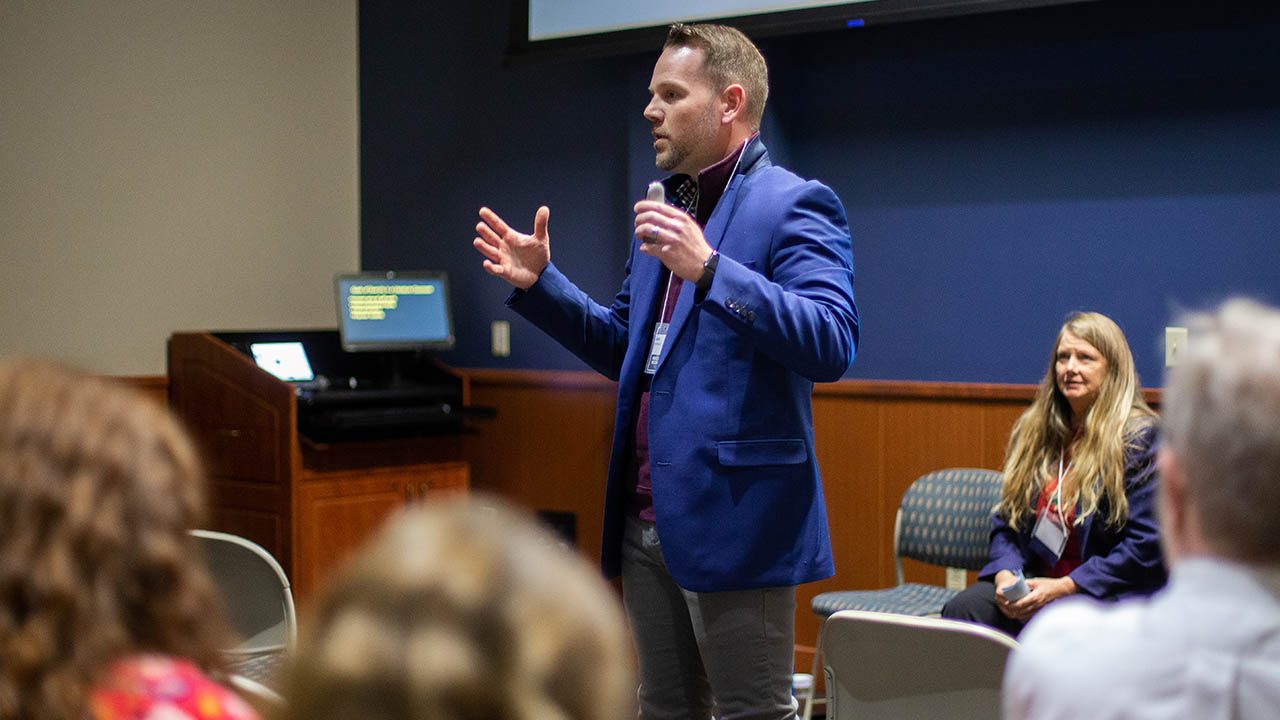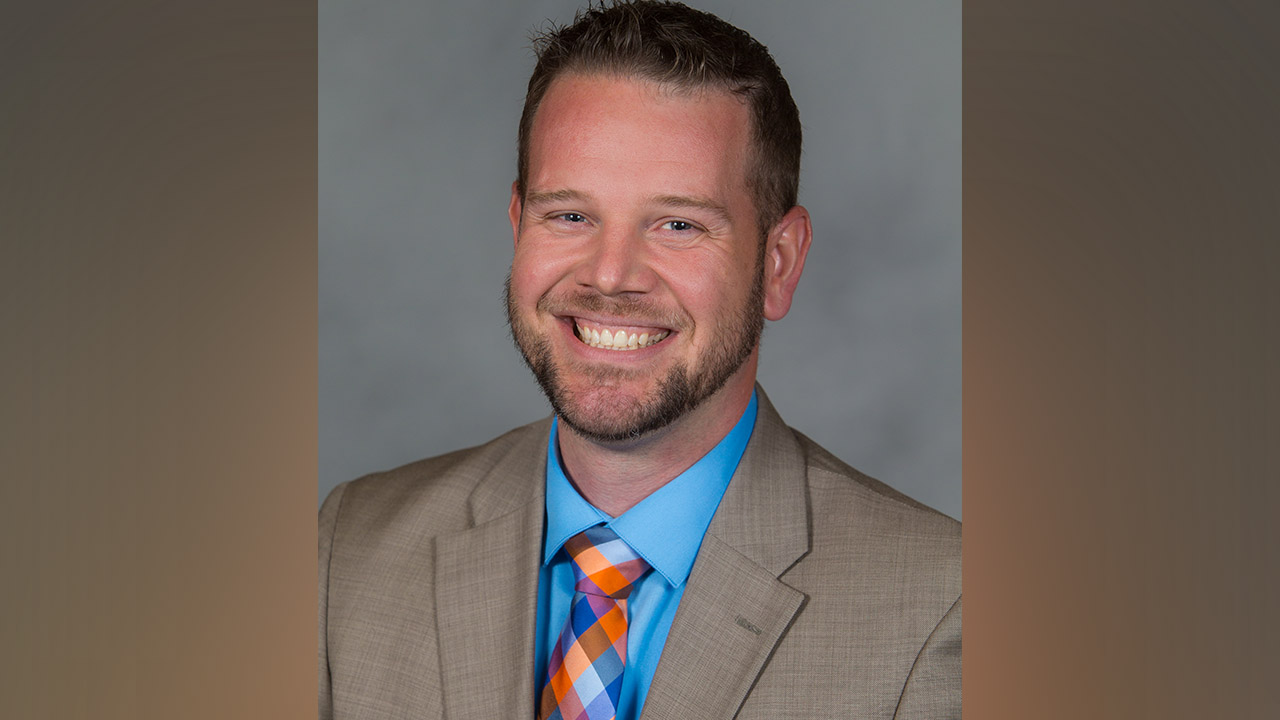

Dr. Joshua Anderson, assistant professor of English, is bringing his experience in rural classrooms to the School of Education. Anderson joined UW-Platteville in 2016 and made the transition from the Department of Humanities to the School of Education this year. Prior to pursuing his doctorate degree, Anderson taught English at the Iowa-Grant School District. Now, as Anderson prepares future educators, he notes it’s always exciting to watch his former students flourish in their own classroom.
“My proudest accomplishment is every time I receive a message from former students celebrating their first job or next job in education,” he said. “I keep in contact with a lot of my former students, and it’s great to see how they are impacting their local communities.”
Outside of campus, Anderson enjoys spending time with his family. “I have three kids. I love being able to be with them and watch the activities they do. I am very much a soccer dad,” he said.
How did your interest in English education begin?
I graduated from Northern Michigan University in 2005 with a secondary English education degree. I started off teaching at the high school level. It was my dream job. I was coaching football and forensics, teaching at the high school level and also teaching some middle school English classes. It’s where I saw myself being as a professional.
Right around 2010, an opportunity came up and a mentor of mine from my undergraduate program recommended for me to come back and work on my master’s. I went back to Northern Michigan University and I worked on my master’s in writing and pedagogy. During the two years I was there, she put a bug into my ear that I should go on and get my Ph.D. I went to Western Michigan University and earned my Ph.D. in English with an emphasis in English education.
My passion for English originally began during my undergraduate years at Northern Michigan University. I have always loved reading and writing, and I really felt passionate about teaching at that point in time. It really wasn’t until I had spent some years in the classroom and had the opportunity to work on my master’s that I really even considered becoming a professor was an option to me professionally. Once that opportunity was presented to me I jumped at the chance to become a professor of English education. I really enjoy working with students who are on that professional cuff where they’re transitioning from student to professional. I enjoy being a facilitator and helping bridge the professional gap as they make the transition.
You have taught in rural educational settings, including at the middle and high school levels. How has that experience translated into your courses at UW-Platteville?
I taught at Iowa-Grant High School and Middle School. I came back to Southwest Wisconsin after being gone for six years; I had a lot of professional connections. I was able to lean on those connections to help bring in local educators into my courses to talk with students and provide a secondary voice within the classroom. It showed them what teachers are doing in the classroom today.
I use a lot of my high school approaches in the classroom at the high school and middle school levels to help students engage with real authentic activities at the university level. I use my classroom as a laboratory and encourage students to work on their craft as educators. As teachers, it’s really important.
You serve as a university supervisor for pre-service teachers during their student teaching experience. What is the most rewarding part of being the liaison between the student teacher and cooperating teacher?
The most rewarding aspect is being able to be the facilitator in bridging the gap. We as liaisons at the university are able to work with our local communities and provide them with valuable services. It’s rewarding to work with the student teachers, but it’s also very rewarding to work with the cooperating teachers. I get to learn what middle and high school teachers are doing on a daily basis. I get to learn what they are struggling with, and I understand more of what the needs are of students in K-12 buildings. In that way, I’m able to better prepare the students in my method courses and upper level education courses to meet the need of today’s current student.
For myself, it’s professionally rewarding because I’m able to take the feedback from the cooperating teacher, and the experience the student teachers go through to help improve the education I’m providing my undergraduate students before they get out into those student teaching experiences.
You teach courses both in the School of Education and Department of Humanities. What do you enjoy about teaching a variety of classes focused in both of those areas?
My initial passion was English, so anytime I have the opportunity to talk about literature, particularly young adult literature, I’m always going to jump at that opportunity. It’s enjoyable because it never gets dull. I like new challenges. I enjoy having the opportunity to work with students at multiple levels whether it’s freshmen or seniors who are about to go off into student teaching. I like to be able to talk about not only what students are reading and help students focus on their writing, but then also have the opportunity to help students think about how do we teach reading in the classroom and how do we teach writing in the classroom? It provides an opportunity professionally that I think is unique to teach in multiple departments, and have the ability to expand the opportunity to work with students on campus in a variety of courses.
What do you hope students take away from your classes?
When students walk away from my class I hope they are more confident in their abilities as educators. When students enter in upper level education courses or method courses they are seeking to have practical, hands-on approaches to teaching in the classroom. I try to have them take a step back and have them consider the why of education. I hope by the time they leave my classrooms, particularly in the education courses I teach, they have a firm grasp on why it is they are teaching the information that they are, and have a firm understanding of why they are teaching in the way they are teaching.
I want them to get away from the idea of this old approach of simply assigning assignments, but really giving careful considerations of what choices they are making in those assignments, what choices they are making in the readings they are providing and have a clear understanding how they impact their students. What are the objectives? What is the purpose in both not only what the content is that they are utilizing, but their approaches to the content and how it can impact their students in the classroom.